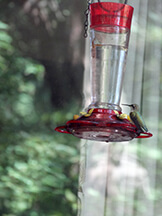Purdue publication offers gardeners tips on proper use of pesticides
November 23, 2015
 |
|
The Purdue publication What Gardeners Should Know About Pesticides notes that it is important to consider surroundings, including those with animals, when using pesticides. For example, it advises to keep pesticides from drifting onto bird feeders. (Purdue Botany and Plant Pathology photo/Fred Whitford) |
WEST LAFAYETTE, Ind. - A new Purdue Extension publication gives gardeners advice on use of pesticides and how to manage a successful garden and landscape.
The authors of What Gardeners Should Know About Pesticides explain several topics on pesticide use in gardens. They offer tips on ensuring plant success, managing unwanted critters and choosing the right control options.
The 64-page publication guides gardeners through the processes of personalized pest management, reducing a pest's impact on gardens and why a pesticide might not have worked. It gives advice on problem prevention, pesticide classifications and the safe, effective, legal use of pesticides.
"Pesticide use in the lawn, landscape and garden provides many benefits, but there are also risks," said lead author Fred Whitford, coordinator of Purdue Pesticide Programs. "You must handle pesticides with caution and understanding."
The publication is available in print for $5.50 or free for download at Purdue Extension's The Education Store at https://www.edustore.purdue.edu. Search for product code PPP-109.
Writer: Chelsea Clodfelder, 765-494-2722, cclodfel@purdue.edu
Source: Fred Whitford, 765-494-1284, fwhitford@purdue.edu
Ag Communications: (765) 494-2722;
Keith Robinson, robins89@purdue.edu
Agriculture News Page

